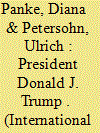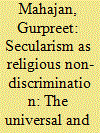| Srl | Item |
| 1 |
ID:
157684


|
|
|
|
|
| Summary/Abstract |
Since his inauguration, US President Donald Trump has made news by violating international and domestic norms, such as norms of diplomatic communication or the non-discrimination norm. This paper uses theoretical approaches to norm eradication in order to examine whether President Trump has turned into an effective agent of norm death leading to the abolition of domestic and international standards of appropriateness. It discusses how the precision of the respective norms, the stability of their contexts, and the actions of norm proponents have played out. This reveals that President Trump’s actions have so far lacked effectiveness, and have not led to norm death. The longevity of challenged norms cannot be taken for granted, however—especially if the challenger is a powerful actor. In order to avoid norm death under this circumstance, it is essential that norm proponents possess capacities and competencies to act, and employ them to defend challenged norms.
|
|
|
|
|
|
|
|
|
|
|
|
|
|
|
|
| 2 |
ID:
022614


|
|
|
|
|
| Publication |
Jan 2002.
|
| Description |
33-53
|
| Summary/Abstract |
Secularism everywhere represents the ideal of religious non-discrimination, but different countries pursue different paths to realize this end. Beginning with this understanding, this article rejects narratives about the uniqueness of Indian society and its conception of secularism. It elucidates the foundational principles embodied in India's constitution and argues that India chose not to follow the policy of "separation." Like many countries in Europe, India pursued religious non-discrimination by ensuring equal liberty for all communities. However, what set India apart is that equal liberty for all communities was not accompanied by a parallel strong emphasis on individual liberty. The policy of equal religious liberty was an extension of the principle of equality of all communities in the public domain. This fundamental norm is today under siege from votaries of cultural majoritarianism. What is at stake in the present-day conflict therefore is not simply religious freedom of minorities but the commitment to equality of all.
|
|
|
|
|
|
|
|
|
|
|
|
|
|
|
|